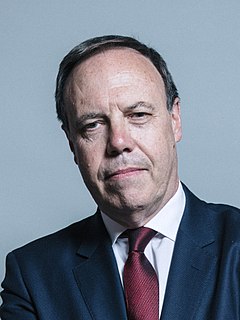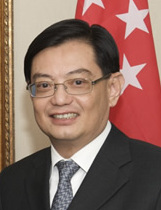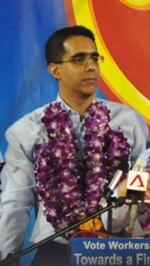
The UK Independence Party is a Eurosceptic, right-wing populist political party in the United Kingdom. As of 2020 it has a single Member of the Senedd. The party reached its greatest level of success in the mid-2010s, when it gained two members of Parliament and was the largest UK party in the European Parliament. The party is currently led by Freddy Vachha, with former acting leader Pat Mountain as Deputy Leader.

New Zealand is a representative democracy. Members of the unicameral New Zealand Parliament gain their seats through nationwide general elections, or in by-elections. General elections are usually held every three years; they may be held at an earlier date at the discretion of the prime minister, although it usually only happens in the event of a vote of no confidence or other exceptional circumstances. A by-election is held to fill a vacancy arising during a parliamentary term. The most recent general election took place on 23 September 2017.

Nigel Alexander Dodds is a Northern Ireland barrister and unionist politician. Dodds became North Belfast's MP in the 2001 UK general election and served in that role until he was succeeded by Sinn Féin's John Finucane in 2019. He has served in the past as a member of the Northern Ireland Assembly, and as Minister of Finance in the Northern Ireland Executive. He has been deputy leader of the Democratic Unionist Party (DUP) since June 2008. In July 2020, Dodds was nominated for a peerage in the House of Lords. He has been Lord Mayor of Belfast twice, and from 1993 has been General Secretary of the DUP.
A voting age is a minimum age established by law that a person must attain before they become eligible to vote in a public election. Today, the most common voting age is 18 years; however, voting ages as low as 16 and as high as 25 currently exist. Most countries have set a minimum voting age, often set in their constitution. In a number of countries voting is compulsory for those eligible to vote, while in most it is optional.

There are currently two types of elections in Singapore: parliamentary and presidential elections. According to the constitution of Singapore general elections for parliament must be conducted within 3 months of the dissolution of parliament, which has a maximum term of 5 years from the first sitting of parliament, and presidential elections are conducted every 6 years.

The 2006 Singaporean parliamentary general election was held on 6 May 2006. 1.22 million out of the 2.16 million eligible Singaporeans voted for members of parliament and elected their next government. The People's Action Party (PAP), in its first election under Lee Hsien Loong, won 66.6% of the overall votes and gained 82 out of 84 seats. The PAP held the office of Prime Minister for a twelfth consecutive term. The general election was held under the first-past-the-post system. The parliament was dissolved by President S R Nathan on 20 April, three weeks before the election. On Nomination Day, the PAP gained 37 seats in divisions which were uncontested by other parties. The main election issues included employment, cost of living, housing, transport, education, the need for an effective opposition voice in parliament, and the quality of the candidates.

Singapore's general election to form its 12th Parliament was held on 7 May 2011. The Parliament of Singapore's maximum term is five years, within which it must be dissolved by the President of Singapore and elections held within three months, as stated in the Constitution of Singapore. Voting is mandatory in Singapore and is based on the first-past-the-post system. Elections are conducted by the Elections Department, which is under the jurisdiction of the Prime Minister’s Office. On 19 April 2011, President S.R. Nathan dissolved parliament. Nomination day was held on 27 April 2011, and for the second election in a row, the PAP did not officially return to power on nomination day, but it did return to power on the polling day. This election also marked the first and the only three-cornered fight since 2001 in Punggol East SMC before it increased to four-cornered fight on a by-election held two years later.

There are five types of elections in the United Kingdom: elections to the House of Commons of the United Kingdom, elections to devolved parliaments and assemblies, local elections, mayoral elections and Police and Crime Commissioner elections. Within each of those categories, there may also be by-elections. Elections are held on Election Day, which is conventionally a Thursday. Since the passing of the Fixed-term Parliaments Act 2011 for general elections, all five types of elections are held after fixed periods, though early elections to parliament and the devolved assemblies and parliaments can occur in certain situations. The five electoral systems used are: the single member plurality system (first-past-the-post), the multi-member plurality system, the single transferable vote, the additional member system and the supplementary vote.

The Singaporean presidential election of 2011 was the fourth Singaporean presidential election, held on 27 August 2011 after president S. R. Nathan term ended in September 2011. Nomination Day for eligible candidates was held on 17 August 2011.

Heng Swee Keat is a Singaporean politician who has been the Deputy Prime Minister of Singapore since 1 May 2019, Coordinating Minister for Economic Policies since 27 July 2020 and Minister for Finance since 1 October 2015 respectively. A member of the country's governing People's Action Party (PAP), he has been the party's First Assistant Secretary-General since November 2018 under Lee Hsien Loong. He previously served as Singapore's Minister for Education from 21 May 2011 to 11 September 2015. He has been the Member of Parliament (MP) for East Coast GRC for Bedok since 10 July 2020. He was the MP for Tampines GRC for Tampines Central from 7 May 2011 to 23 June 2020.

Adrian Tan Cheng Bock is a Singaporean politician and medical doctor who is the founder and first Secretary-General of the Progress Singapore Party (PSP). He also stood for the 2011 presidential election and won the second highest number of votes at 34.85% among all four candidates, losing marginally by 0.35% to the winner Tony Tan.

Amod Prasad Upadhyay is a Nepalese social worker and politician.

Pritam Singh is a Singaporean author, lawyer and politician who has served as the Secretary-General of the Workers' Party and Leader of the Opposition since 8 April 2018 and 11 July 2020 respectively. Singh has been the Member of Parliament (MP) representing the Aljunied Group Representation Constituency (GRC) for Eunos since 7 May 2011.

The 2015 Singaporean general election was held on 11 September to form Singapore's Parliament. The previous Parliament was dissolved on 25 August 2015 by President Tony Tan on the advice of Prime Minister Lee Hsien Loong, and candidates were nominated on 1 September that year.

Snap elections to the Verkhovna Rada took place on 26 October 2014.

General elections were held in the Solomon Islands on 19 November 2014. Independent candidates won 32 of the 50 seats in the National Parliament, with the Democratic Alliance Party emerging as the largest party with seven seats.

The 2020 Singaporean general election was a general election held in Singapore on 10 July 2020. It elected members of parliament to the 14th Parliament of Singapore since Singapore's independence in 1965, using the first-past-the-post electoral system. Voting was mandatory for all Singaporeans who were aged 21 or above as of 1 March 2020.

General elections were held in Zimbabwe on 30 July 2018 to elect the President and members of both houses of Parliament. Held eight months after the 2017 coup d'état, the election was the first since independence in which former President Robert Mugabe was not a candidate.
The right of expatriates to vote in elections in their country of origin varies depending on the legislation of an expatriate’s country of origin. Some countries grant their expatriate citizens unlimited voting rights, identical to those of citizens living in their home country. Other countries allow expatriate citizens to vote only for a certain number of years after leaving the country, after which they are no longer eligible to vote. Other countries reserve the right vote solely to citizens living in that country, thereby stripping expatriate citizens of their voting rights once they leave their home country.

General elections were held in South Africa on 8 May 2019 to elect a new National Assembly and provincial legislatures in each province. These were the sixth elections held since the end of apartheid in 1994 and determined who would become the next President of South Africa.
















